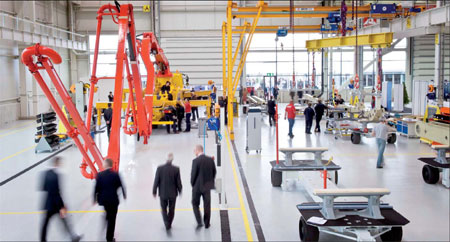
Investors make their mark
Updated: 2013-10-04 08:59
By Li Jiabao (China Daily)
Comments Print Mail Large Medium Small|
Sany Group employees walk through the company's production hall in Bedburg, Germany. Provided to China Daily |
Healthy fundamentals may prompt Chinese companies to maintain robust investment pipeline in Germany
Chinese enterprises are expected to maintain their robust levels of investment in Germany, while some sectors like auto parts may see major upswings, due to merger and acquisition moves, leading industry experts say.
"There is no doubt that China is now eyeing more investment options in developed countries, especially nations like Germany. Though the current investment levels are still moderate, the robust growth rate is a healthy indicator for the future," says Martin Broda, general manager of the Beijing Branch of Commerzbank, a German lender. Broda attended the Investing in Germany China Roadshow 2013 in Beijing last month.
Markus Hempel, the China representative of the Investment Promotion of Germany Trade & Investment, says that Germany is now the most preferred European destination for Chinese investment, considering that Chinese FDI in Europe has grown significantly over the last few years.
"As the leading economy in the EU, Germany provides an excellent investment environment for foreign companies with its top-notch infrastructure, innovation, other incentives and high productivity," Hempel says adding that Germany has also become the new geographic center of the EU with its rapid, easy access and connectivity to all the major markets.
Outward direct investment from Chinese companies in Germany surged by 56 percent year-on-year to $799 million (589 million euros) in 2012, accounting for 13.1 percent of China's overall outbound investment in the European Union. The cumulative value of China's outward direct investment in Germany increased from $129.21 million at the end of 2004 to $3.1 billion by the end of 2012, according to the 2012 Statistical Bulletin of China's Outward Foreign Direct Investment.
China's strategy of encouraging domestic companies to spread wings in international markets, launched in 2000, has also triggered upswings in China's outward FDI and helped the economy focus more on innovation, Broda says.
"Chinese companies must increase their role in the international market. After the first phase of exporting products, they are now in the second phase of manufacturing abroad. Hence it's natural for Chinese companies to spread wings in Germany," says Sebastian Daub, the Corporate and M&A partner at Linklaters, a Frankfurt-based law firm.
"There is a huge gap between US investment in Germany and that coming in from other nations. Chinese investments are slowly gaining ground in Germany. We anticipate more investment as the economy matures further and more Chinese companies learn the proper investment and communication strategies in Europe and Germany," Daub says.
Many Chinese entrepreneurs feel that Germany offers the best facilities for setting up headquarters, research, logistics and production units, while other industrialized countries such as France and Great Britain trail by a wide margin, says a recent survey conducted by global accounting firm Ernst & Young among 400 managers of Chinese major companies.
Though more than 29 percent of the respondents choose the US as their top destination, 25 percent of them opted for Germany as the most attractive investment location after their home country. Entrepreneurs active in foreign investment during the past five years put Germany at almost the same level as the US, according to the survey.
China was the third largest investor in terms of projects in Germany in 2012, after the US and Switzerland, according to the economic development agencies of the German Federal States 2013.
Broda says that Chinese outbound investment in Germany focuses on three key industries: automotive, industrial machines and equipment; electronics and semiconductors; and consumer products (including food and beverages), accounting for 62 percent of total Chinese outward FDI in Germany.
GA Pack, a China-based manufacturer of aseptic packaging, had earlier this year indicated that it would invest 38 million euros to build a second production line in Germany after investing 50 million euros on its first unit in the same country in 2011.
"Germany is traditionally known for improving on what is already good. We greatly value the German employees - much like the entire society - who place an emphasis on quality, both in results and processes," says Hong Gang, chairman of the board of GA Pack GmbH.
Huang Qun, partner of Taylor Wessing, an international law firm with over 900 lawyers across Europe, the Middle East and Asia, says that Chinese companies will conduct more M&As in the German auto parts sector. "The overseas M&As of Chinese companies have become more purposeful and are aimed at acquiring core technology in the EU or Germany. Most of the German auto parts makers are family businesses plagued by capital shortage or lack of proper successors".
Xu Xing, general manager of construction machinery maker Sany Deutschland GmbH says that, "by setting up a factory in Germany, we have been able to expand our business activities to other European nations".
Huang from Taylor Wessing says that Chinese enterprises often face risks due to differences in language, culture and business models during cross-border M&As. "This leads to mistrust and is often a key obstacle in the success of the transactions."
Chinese investment in the EU started to gain momentum in 2008 and the flow of China's outward direct investment into the 28-member bloc rose to $6.12 billion in 2012, accounting for 7 percent of the country's total and 87 percent of the bloc's total.
Though the value declined by 19.1 percent from the previous year, Zhou Zhencheng, commercial counselor of the Department of Outward Investment and Economic Cooperation at the Ministry of Commerce, feels that the figure of China's ODI in the EU was distorted as much of the flow was via Hong Kong. The mainland's outward direct investment in Hong Kong surged 43.7 percent year-on-year in 2012.
A recent report published by consultancy firm Rhodium Group indicates that the eurozone crisis has been one of the main reasons for higher Chinese FDI in Europe. "Chinese investors have seized the opportunity to invest in cash-strapped companies that offer stable long-term growth such as utilities and infrastructure," says Thilo Hanemann, research director and author of the Rhodium report.
Bai Ming, a researcher with the Chinese Academy of International Trade and Economic Cooperation, feels that China's active overseas investment will help prevent trade barriers and expand exports apart from other tangible benefits to local communities, such as employment.







